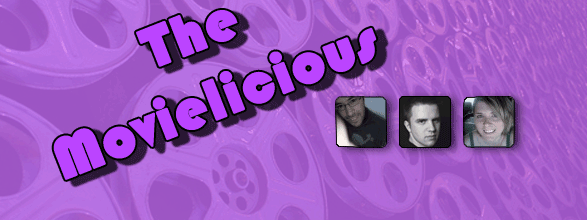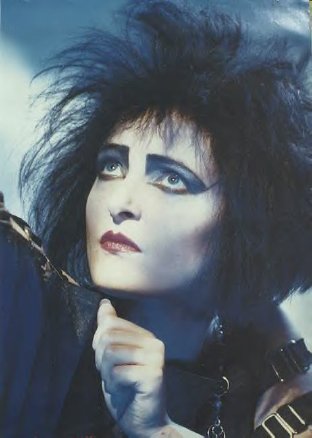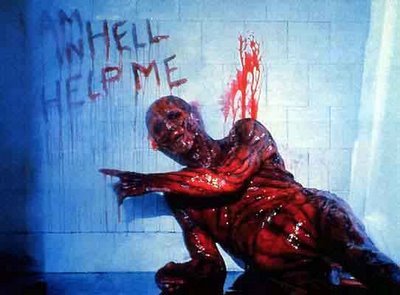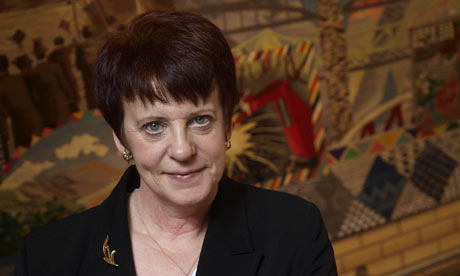![]()
![]()
![]()
![]() Julia's Eyes (2010)imdb linkOne line synopsis:
Julia's Eyes (2010)imdb linkOne line synopsis: The story of a woman who is slowly losing her sight whilst trying to investigate the mysterious death of her twin sister.
Genre: Horror/Thriller
Another movie
produced by Guillermo Del Toro. I think it's important to note that, asides from Mimic (which Del Toro is pretty miffed about), he has a really good track record for movies. The list of movies he has produced is nothing like as impressive. It must be said that Julia's Eyes contains a lot of good ideas. It's just that none of them are very well executed and sometimes ideas are ignored as if they were never put forward in the first place.
![]()
Fans of "Sherlock" will remember the first episode featuring a mystery of a number of victims who have all committed suicide. We have similar situation in the set-up for Julia's Eyes. Julia's sister Sara is being harassed by an unknown intruder and is flailing in the dark. She then stands on a stool and puts her head in a noose. Why has she done this? How did the villain of this murder mystery convince her to do that? She even shouts at the villain in this first scene defiantly, as if she doesn't really intend to hang herself at all. - Unfortunately, this major part of the mystery is, as far as I could tell, never solved. It seems that people in this film happily put their heads in nooses
because the script says so.
So, the film gets started and I must admit that I had mixed feelings very early on. The film seemed to be taking on the style of a ghost story - and I've long had issues with the ghost story style. Ghost stories often involve ghosts with no proper rules. They harass, intimidate and attack people, but whether they succeed in killing people tends to have no real pattern. On the other hand other rules can be set up that make no sense, like the ghost's real aim being that their murderer be sent to prison. (The ghost cares about prison, why?) By the end, the ghost either turns out to have some fatal weakness or some kind of unfinished business. The ghost is finally exorcised, defeated, has their revenge or, in the cheesiest cases, the kind-hearted protagonists solve the unfinished business so the ghost can go to heaven. The classic case of a crap ghost story is "What Lies Beneath" (2000 - starring Harrison Ford and Michelle Pfeiffer). It features a ghost with unfinished business and the most horrendous communication skills imaginable.
I think comparisons with The Eye (2002 - Hong Kong film directed by the Pang Brothers) are unavoidable. While "The Eye" was more in the style of films like "The Ring", the draw was the idea that the main protagonist is uncertain about the world around her because she has problems with her eyes. In "The Eye" the protagonist had been given an operation to allow her to see for the first time (as far as she could remember) in her entire life. However, as she learns to use her new sense of sight, hallucinations are to be expected and in many ways her sight can feel like more of a curse than a blessing. Now, "The Eye" actually features ghosts and I'm not sure what makes me give it a pass. It was just very imaginately done. At the early stages of "Julia's Eyes", I felt that we were getting the same sort of confusion about real world events, except that the cause wasn't ghosts, but rather it was real life misunderstood due to her specific eye problems. For example, at one point Julia believes she feels her husband's hand on her shoulder, comforting her. When she looks up she suddenly realises that her husband is several feet away talking to someone. The mysterious man touching her shoulder disappears and, with her impaired eyesight, she cannot tell where he went. Quite creepy and it's a good idea that could have worked pretty well. Eyesight problems are being used to replace the supernatural.
![]()
Then, rather randomly, we are suddenly told very eloquently and in a no-nonsense fashion that the villain actually does have something genuinely supernatural about them:
"There are people with no light. Do you know what it is like to walk in somewhere and not be noticed? Or to walk on the street and have people stumble against you? Or to ask something for the third time and have no one answer your question? That's the man you are looking for. A pause, a vacuum. An absence."Those are some awesome lines, aren't they? Now magic realism can be a problem for a movie if it's not consistent, but if the filmmakers decide to make this a genuine rule (or at least explain why this one character thinks it is true) then we could have a really good idea here. Unfortunately, while this is used in a few more scenes the filmmakers seem to lose faith in the idea. Not before making me think that the film was going to get rather more interesting first though.
![]()
The "invisible man" belief is gradually explained away as a psychological issue of the villain himself with Freudian undertones. While Julia's belief in the whole idea might be explained by her experiences with her eyesight problems, that still doesn't explain how the man who conveyed the idea to her in the first place ever came to believe it, nor the very real issue that no one ever seems to remember what this mysterious figure looks like. The filmmakers clearly decided that fantasy elements don't really work in their film, making a great deal of the plot into a huge betrayal.
![]()
Towards the end, as the film gets more convoluted and daft, there are still some quite interesting bits. There's one part where Julia is pretending to be completely blind which, to me, represents the only properly tense scene in the whole film. However, since the tension doesn't continue to be effectively built up, that tension is pretty much lost. There are a lot of points at this stage in the movie where the scene changes. If they'd stuck to a single location then the tension might have built up more consistently. "The Disappearance of Alice Creed" (2009) comes to mind as a film where very few changes in setting is used to good effect. Later we have a rather interesting hunt going on in a dark house using the flash of a camera. It's quite interestingly filmed, but unfortunately that goes on too long and I found myself losing interest.
![]()
Quite a massive problem though was pointed out by a rather astute commenter on imdb. In the scenes where Sara or Julia are living in their house on their own while dealing with a relatively recent case of blindness, they decide to wear high heels. *facepalm*
There is so much missed potential in this film, but every good idea is messed up. This ends up resorting to a pretty by-the-numbers murder mystery by the end, only with plot holes you could drive a double decker bus through. Rather bizarrely Mark Kermode had this on
his list of five favourite movies at the mid-point of the year (and that's in a list where two of the entries were documentaries).
D- (Not good and not very entertaining)La Horde (2009)imdb linkOne line synopsis: An end of the world battle between gangsters, cops and zombies.
Genre: Zombie movie
This French zombie film hadn't been rated very highly, but
the trailer looked so impressive that I decided to check it out anyway. Did it live up to the trailer? Well, no (but when do films ever manage that?). However, I couldn't understand the wide panning this film has received. In fact, I felt the need to watch this film a second time just to be sure I hadn't made a mistake. My first theory was that people were upset by the lack of action, but oddly many of the criticisms seem to say almost the exact opposite. I mean sure they seem to say that the action is too cliched, that there's too much gore and the like, but no one seems to be saying that they were expecting a more action-packed and less character-focussed movie.
![]() This is precisely the sort of image that could give you the wrong impression about "La Horde".
This is precisely the sort of image that could give you the wrong impression about "La Horde".The film begins with simply a dead body. No coming back to life. No monsters. But already there's clear evidence of a culture of violence as a man looks angrily down at the body of a fallen comrade lying in a rubbish dump. At the funeral it's clear that a number of people close to the murdered man are planning some kind of revenge attack, making it look likely that this is a criminal gang. The sense of family amongst them feels very gang-like. So imagine my surprise when it turns out that these are actually police working outside of their remit in order to ensure that they get justice. A clear sign that they are probably corrupt. However, their attempt to ambush a Marseille gang which appears to be run by two Nigerian immigrant brothers goes very wrong. The sounds of a growing number of police cars and fire engines outside (which we in the audience know could not possibly have been called in by our corrupt police officers making their off-the-books attack) do not endear the gang members to our police officer protagonists.
![]()
It's not long however, before we start seeing zombies. They appear to have super strength and only a bullet in the head will do the trick. Two common criticisms of The Horde have included that the protagonists don't always aim straight for the head and that we are never given an explanation for where the zombies came from. Needless to say, if you aim for someone's head you are liable to miss. The torso is a much easier target and even if our protagonists can really accept that these monsters cannot be harmed by bullets to the chest, that still doesn't mean that they shouldn't use it as a method to slow the zombies down. Better to hit them in the chest and slow their advance than to miss their head and be killed all the sooner. As for explanations for zombies, I think anyone who thinks "radiation" is a proper explanation for the zombies in "Night of the Living Dead" is kidding themselves. I could be wrong, but I think anyone who dies with their head intact in "La Horde" becomes a zombie, making this completely consistent with Romero zombie rules.
![]()
There are some rather cool scenes where characters attempt hand-to-hand combat with zombies. So long as you aren't bitten you ought to be able to knock a zombie down and while killing a zombie isn't easy, stopping them from moving is still possible. Still, there does appear to be one scene where someone is basically locked in a room with two zombies unnecessarily so that we can watch him fight, when really his friends should have helped to get him out of there.
![]() She turns out to be a real badass.
She turns out to be a real badass.I said before that this is quite character-focussed and I mean it. Of course, police who were seeking revenge teaming up with gang members who have no problem murdering police is a rather problematic scenario. The question that arises is, can both sides really forget who they are? Can they ever let down their guard and trust each other? If new alliances are being made between these two groups, what does that mean for existing relationships within both groups?
There's also the aspect of family. The first of the Nigerian brothers we see looks pretty scary the first time we see him. There's a definite difference between him and another black gang member who he sends downstairs. However, his brother, while not having the same gravitas, is similarly brutal and, we notice, a little unstable. Regularly the older brother has to caution his younger brother not to take things too far and to keep a level head. There's also sense of brotherhood amongst those living in this decrepit block of flats which is paralled by the sense of family between the police officers (which I'm not sure I entirely understand. Are all the police officers related?).
![]()
Things get more interesting when they run into Rene, an ex-soldier with some knowledge of explosives who seems to feel more affinity with the low-life types where he lives than for the police and, it seems, he also misses the thrill of the war zone. He refers to all zombies as "chinks" and this appears to be related to the area he was fighting in when he was in the army. With no asians in the gang/police team-up, nobody takes offence to him using the term. And certainly no one in either team is really in much position to criticise his character. Still, it's interesting to see a character introduced at this stage who is so larger-than-life that he can weird out both the police and gang members alike, yet he has a commanding enough presence that he's able to assert himself pretty well amongst both. Rene is played by an actor called Yves Pignot and he gives a really entertaining performance.
![]()
One idea that is done particularly well in La Horde is the "feeling sorry for the zombies" trope. It's so often done badly (in "Nightmare City" for example) and of course, the big problem is that man-eating members of the walking dead don't easily attract sympathy. Well, on the one hand we are told that the zombies are starving and certainly if there's one thing we can accept about zombies, it's that they are ravenous. However, the real source of pity for the zombies isn't to do with "cruelty to zombies" per se, but rather more to do with what that cruelty suggests about the living human beings performing it. One of the Nigerian brothers finds that the mockery of a zombie no longer able to walk stirs up memories from before he and his brother came to Marseilles. The question isn't "How dare you treat zombies that way", but more "Do you think this is funny? Do you think you're a badass?" It's clear that this character can see all too easily how in another scenario the victim of this behaviour could be an innocent human being. Both he and the audience are sickened by their behaviour in a way that doesn't always come across in similar scenes in Romero's "Of The Dead" movies.
The ending is perfect. The film as a whole is a bit by the numbers, but it's good fun. There is a limit to the amount of action, but a great deal of it works very well. Overall, this isn't a masterpiece, but it's a very good solid piece of entertainment and a must-see for any zombie fans.
B- (Solidly good movie)It Came From Outer Space (1953)imdb linkOne line synopsis: A spaceship from another world crashes in the Arizona desert, and only an amateur stargazer and a schoolteacher suspect alien influence when the local townsfolk begin to act strange.
Genre: Science fiction classic/ monster movie
"It came from outer space" is one of those over the top titles which have come to define cheesy 50s sci-fi, but I'm discovering more and more that the cheesier titles often seem to hide more entertaining movies. I seem to be finding myself a much bigger fan of movies with more obvious titles like "Earth Vs The Flying Saucers" and "Them!" than I am of movies like "This Island Earth" or "Forbidden Planet". Possibly luck of the draw to some extent, but I certainly found "It Came From Outer Space" was a lot better than I had any right to expect.
![]()
That said, this was originally released in 3-D format (and unsurprisingly I wasn't watching it that way). There were a few points where the gimmicky format seemed rather more obvious. In some cases it didn't matter. When the spacecraft is crashing to Earth and there's a shot of it flying straight towards the camera that's still cool with or without the 3-D effect. Later on, however, when the male protagonist is checking out the crater and an avalanche is set off the camera seems to spend far too long looping between one camera angle showing the man trying to avoid falling rocks and another where the falling rocks are coming straight towards the camera. It'd be nice to see how well the 3-D effect worked all the way back in the 50s, but right now the "it's coming right at you" intention is a little too obvious. That said, it's not really an issue found too often in the film.
There's another point that felt annoying where the male protagonist is pointing a torch around and the female protagonist screams when a joshua tree comes into centre-frame. I wonder whether this scene was more emphasised by the 3-D effect. Of course, the audience isn't scared by joshua trees (and considering the number of joshua trees around in the setting, neither should the female protagonist), so perhaps this is the predecessor to the
milipede nonsense in the American remake of "The Ring". This isn't the only time we have irritating screams from the female protagonist either and I think this was generally overdone, not least seeing as she doesn't really come across as easily frightened asides from these sudden high-pitched screeches every so often.
While the alien is shown pretty early on in the film, a lot of shots are shown from the aliens perspective and avoid showing the alien at all. There's a good reason for this which I'll avoid explaining right now. The aliens are depicted as having one eye, so the 'alien perspective' shots appear to be shown as if looking through a large blob of jelly.
![]()
The movie starts with John Putnam, an amateur astronomer, noticing a large meteor (or so it seems) crashing down to Earth. He and his girlfriend, Ellen Fields (played by the gorgeous Barbara Rush), decide to check it out. John insists that Ellen stays out of the crater, but he sometimes has a tough time convincing her to stay put. (It's good when the sexism can, arguably, be placed on a character rather than the filmmakers, especially when the sexism is tied to misplaced protectivism rather than obnoxious condescension.) In the crater John sees an alien spaceship but, when spotted, the aliens hurriedly shut the spaceship door, triggering an avalanche. John escapes the crater unharmed, but the spaceship is now buried. John believes that the spaceship will be unearthed by scientific researchers and happily lets journalists know his beliefs about the involvement of alien beings. Unfortunately the scientific evidence points to a simple meteor and a single witness isn't deemed enough to warrant a highly expensive dig. John is viewed as either a nutcase or a troublemaker.
![]()
Ellen joins John as he searches for answers, taking time off work at a local school where she teaches. The Sheriff criticises John for leading her astray, having already decided that his astronomy hobby is bizarre behaviour. Meanwhile the audience knows that at least one of the aliens left the spaceship before John and Ellen turned up at the crater and it's still probably wandering somewhere in the desert.
There's a wonderful point where the movie really captured me, where John finally receives a proper answer from the aliens. The problem is a matter of trust. If the aliens tell you to back off, can you trust them to keep their end of the bargain? What might happen if you decide not to trust them?
![]()
The pacing isn't always perfect, but then again it is a movie trying for a consistent sense of ominous dread. Certainly this would come to be done to much greater effect in my personal favourite "Invasion of the Body Snatchers", but then again that doesn't involve the same kind of ambiguity present here. There's a consistent uncertainty as to whether these are rampaging monster aliens or misunderstood "E.T." aliens and there's some really good sci-fi-ey questioning going on regarding this issue.
"It Came From Outer Space" is a genuine classic sci-fi movie. It's stood the test of time very well and there are clear signs of elements inspiring later works. In some cases improving on those elements or, perhaps in the case of Ed Wood's "Plan 9", failing to live up to them. The central performances keep us invested in the plot and as "John Putnam" manages to pull off the very awkward task of explicitly pointing out all the elements that the film wants us to think about without sounding contrived or confused. (Watch "Nightmare City" to see
just how bad it can get when a character starts drawing out morals.) Like I said, it's not perfect, but it's damn good all the same.
B+Mario Bava's "Black Sabbath" (I tre volti della paura) (1964)imdb linkOne line synopsis: A trio of atmospheric horror tales.
Genre: Horror
This was a set of three rather cheesy short films with an introduction by Boris Karloff (as well as an outro from him too). To be honest, I enjoyed the bits where Boris Karloff talked up the short movies rather more than the short films themselves.
![]()
We have a very early slasher movie, where a woman is harassed over the phone by a now-released convict with a grudge. We have a vampire story in a rural setting along with a protagonist who does not believe in vampires. Finally we have a ghost story in Edgar Allen Poe style where guilt eats away at our protagonist as lights and noises plague her in the night.
![]()
I can't say I was terribly impressed with any of the stories, but they were fun all the same. Perhaps many of the elements in this film were probably being used for the first time and weren't the cliches they seem to be today. Certainly Black Sabbath has not aged well. However, I feel I must judge a film as it appeared to me and not as it would have appeared to an audience of the time. (And I think this would be seen as pretty silly in any era.)
![]()
There were elements that could have made for a rather better film and there was a good sense of fun. However, this hasn't aged well and it's still very cheesy. I'm glad I watched it though, all the same.
C+ (Contained elements that could have made it a good solid movie)x-posted to ![[info]]() candycorncomm
candycorncomm






















![[info]](http://l-stat.livejournal.com/img/community.gif?v=87.2)








![[info]](http://l-stat.livejournal.com/img/userinfo.gif?v=87.2)












.jpg)























![[info]](http://l-stat.livejournal.com/img/community.gif?v=87.3)















